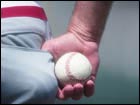
NEW YORK (CNN/Money) -
Two baseball teams had to get bank loans to help them make recent payroll payments to players, according to a published report.
The New York Times reported Friday that the teams, the Tampa Bay Devil Rays and the Detroit Tigers, had to borrow money to make the June 15 payroll payments, and that the Tigers also faced questions about making the July 15 payroll before making arrangements.
The report comes as baseball faces the next round of negotiations with the Major League Baseball Players Association, which is weighing whether to call a strike before the end of the season. Its last strike in 1994 and 1995 led the cancellation of the World Series.
Baseball has claimed it is seeing widespread losses, with 25 of the 30 teams losing money. Management negotiators are seeking greater sharing of local revenue, such as ticket and television money, between high-revenue and low-revenue teams, as well as provisions that would serve as a curb on player salaries.
The players union has questioned the seriousness of the financial problems and wants something much closer to the status quo in the new contract.
The paper quotes officials from the teams saying they had met their payrolls and believed they would not have problems meeting future payrolls, and it quotes Major League Baseball's Chief Operating Officer Bob DuPuy as saying, "I believe any issues with regard to meeting expenses currently have been resolved and that there's no immediate problem for any team." DuPuy did not identify the teams that had faced problems.
Besides negotiations with the players on a new contract, Major League Baseball is moving ahead with plans to try to disband two teams before the start of next season. It attempted to close two teams this season but was blocked by the courts. An arbitrator is expected to rule Monday on the union's challenge to the contraction plan.
The Times report said the teams got the bank financing they needed by presenting a letter from Commissioner Bud Selig that he was going to release money from Major League Baseball's central fund, and then borrowing against those future payments. That fund holds revenue due to each team in the league from league-wide resources, such as marketing and national television contracts.
While baseball has not released the size of the funds, its financial numbers suggest it went into this season with hundreds of millions of dollars in it. A top major league official confirmed to CNN/Money in December that the fund does hold $200 million to $300 million at different times.
Selig has expressed concern about debt levels in baseball, which he has estimated have reached $3 billion, although his figure includes the value of future payments due on long-term player contracts, not just bank debt.
Figures released by Major League Baseball after the end of last season shows the Tigers, which plays in a new stadium, as taking the largest hit from interest payments in the league, with interest payments causing a $16.4 million swing from an operating profit before interest of $5.7 million to a loss from operations of $10.7 million.
Tampa Bay, an expansion team that joined the league in 1998, had the sixth-largest swing in results due to interest payments and it would have lost $10.5 million before interest payments and posted a $17.9 million loss after interest, according to the league's figures. Its overall operating loss was the sixth largest in the league, and the worst of the so-called small-market teams. The five teams with larger losses were all large revenue teams that had among the league's largest payrolls.
This year both the Devil Rays and the Tigers are in last place in their divisions, and are near the bottom of the majors in terms of both attendance and team payroll.
The Tigers have seen average home attendance fall 21.6 percent from last year and 38 percent from 2000, its first season in a new ballpark. Its only sellout was on opening day. The team's payroll was estimated to be $55.0 million, 20th of the major's 30 teams. The Tigers recently traded their top pitcher to the league's richest team, the New York Yankees, for a number of minor league prospects with low pay.
Tampa Bay hasn't seen a home sellout this season. It was already last in the American League and second to last in the majors in attendance last season. Its opening day payroll was estimated at $34.4 million, the lowest in the majors.

|

